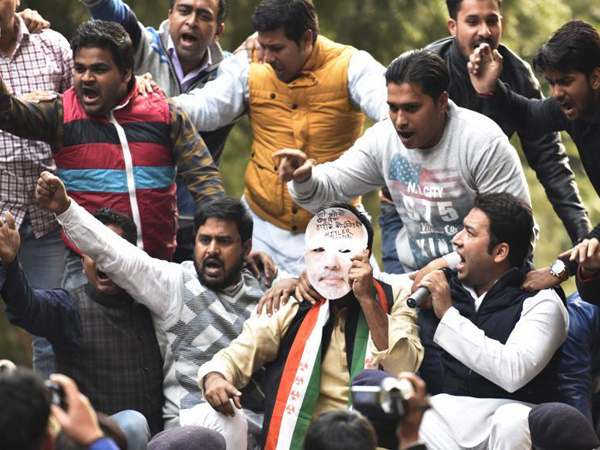Courtesy Hindustan Times
The political row over the presentation of the Union Budget on February 1, ahead of the polls in five states, has yet again exposed the cavalier approach of principal opposition Congress in formulating its strategy – a misnomer given its contradictions and incoherence.
The party has taken the lead in opposing the Budget presentation ahead of the assembly elections, arguing that it would give the ruling BJP an unfair opportunity to influence voters by showering sops. In opposing it, the grand old party has taken another U-turn -– one of many in recent times.
“The time has come to think differently. There are strong arguments for changing the schedule of the Budget presentation,” senior Congress leader Jairam Ramesh had said last August. A month later, party spokesperson Abhishek Manu Singhvi reiterated: “Technically, there would be nothing wrong in advancing the Union Budget.”
The Congress thinks differently now, considering that it has joined other parties in petitioning the election commission against advancing the Budget session. This is not the first time wisdom has dawned so late on the opposition party. It has often been blindsided by the BJP’s shrewd political tactics and manoeuvres.
The Congress supported demonetisation in its initial days, choosing to criticise only its faulty implementation. A week into the winter session of Parliament, the party changed its stand and started questioning the decision itself. Congress sources said there were “no structural or comprehensive” discussions within the party on its stand on demonetisation. Instead, party leaders had to take cues from vice-president Rahul Gandhi’s utterances and speeches on the issue.
“They (Congress) would have cornered us if they had stuck to the implementation part, instead of opposing the decision itself. Now, people see them standing with black money hoarders,” a senior Union minister told HT on Thursday.
The last winter session of Parliament also witnessed frequent flip-flops by the Congress, much to the amusement of the ruling camp. Prime Minister Narendra Modi took little time to grant an audience to a Rahul-led delegation on farmers’ issues on the last day of the session – a move that drove a wedge in the united opposition. Leaders of other opposition parties were taken aback by the Congress vice-president’s unilateral move, which flew in the face of the party’s stand to not allow the Rajya Sabha to function until Modi came to hear and respond to the debate on demonetisation. In the Lok Sabha, the Congress and other opposition parties disrupted the proceedings for weeks, demanding a debate under rules that entailed voting. Towards the end of the session, Congress leaders made a U-turn and wanted a debate under no rules.
On the first day of the winter session started, the Congress initiated a debate on demonetisation in the Rajya Sabha. It, however, abandoned the debate mid-way and resorted to disruptions from the next day.
Questions on the reasons for these flip-flops are answered by Congress leaders with a shrug of the shoulders and a grimace. “You people should find out. Tell us why the same team (of central office-bearers) who were responsible for the 2014 debacle continues to hold sway. Why do you think organisational elections are being postponed?” a senior Congress leader told.
After the UPA was voted out of power in 2014, the core group — an informal think tank comprising leaders such as Manmohan Singh, Sonia Gandhi, Ahmed Patel, AK Antony and P Chidambaram — ceased to exist. There is no formal or informal mechanism any more to formulate the party’s stand on issues through comprehensive deliberations with a long-term, holistic perspective.
After Rahul’s induction into the organisation in 2007, the Congress had set up a Group to Look into Future Challenges, comprising him and 12 senior leaders. It submitted a report on the party’s future roadmap – which was never made public— and slipped into oblivion after that. Congress president Sonia Gandhi proposed to set up a professional party think tank meant to be run on institutional lines during a party session at Burari in 2010. It was never acted upon.
For a 131-year-old party that aspires to regain its past glory, ad-hocism in its approach to issues of national interest might not inspire people’s confidence.
For More News Update Click Here




